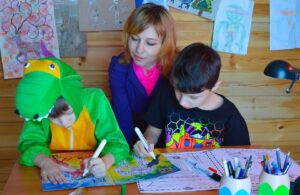Creating a joyful family environment is a vital aspect of fostering a nurturing and supportive home life. A happy family not only provides a strong foundation for individual growth but also contributes to the overall well-being of its members. By focusing on building positive relationships, encouraging open communication, and establishing cherished traditions, families can cultivate an environment that resonates with joy and fulfilment.
Establishing family traditions
One of the most effective ways of bringing joy into a family environment is by establishing and maintaining family traditions. These rituals, whether simple or elaborate, create a sense of belonging and continuity. Traditions can include regular family dinners, holiday celebrations, or annual vacations. They serve as cornerstones for shared experiences and memories, often becoming the stories that bind families together. Consistently incorporating these practices into family life helps reinforce a sense of identity and strengthens familial bonds.
Encouraging open communication
Open communication is crucial in creating an atmosphere of trust and understanding within a family. When family members feel comfortable expressing their thoughts and emotions, it fosters a climate of mutual respect and empathy. Encourage regular family meetings or discussions where everyone can voice their opinions and concerns without fear of judgment. By listening actively and acknowledging each other's perspectives, families can resolve conflicts more effectively and prevent misunderstandings, leading to a more harmonious living environment.
Creating a supportive atmosphere
A supportive family environment is one where each member feels valued and encouraged to pursue their passions and interests. Offering emotional and practical support during challenging times can significantly boost a family’s happiness quotient. Celebrate individual achievements and milestones, no matter how small, to nurture a sense of accomplishment and pride. By providing reassurance and backing, families can help each other face adversities and grow stronger together.
Fostering empathy and compassion
Teaching empathy and compassion is fundamental to nurturing a joyful family environment. Encourage family members to consider each other's feelings and perspectives, promoting a sense of empathy that enhances relationships. Simple acts of kindness and understanding make a significant difference in how family members relate to one another. By modelling compassionate behaviour and instilling these values from a young age, families cultivate an atmosphere where everyone feels loved and accepted.
Balancing individual and family time
While family togetherness is important, it is equally essential to respect and nurture individual pursuits. Encourage family members to explore their interests and hobbies, providing the space and resources they need. Balancing personal and family time ensures that everyone feels fulfilled both within and outside the family unit. Creating opportunities for individual growth alongside family activities can lead to a more holistic and satisfying family experience.
Promoting play and fun
Incorporating play and fun into everyday family life is a powerful way to nurture joy. Engage in activities that promote laughter and enjoyment, such as playing games, exploring new hobbies, or going on adventures. These moments of fun and relaxation help alleviate stress and strengthen family connections. By prioritizing enjoyment and spontaneity, families can maintain a vibrant and positive atmosphere that keeps everyone looking forward to shared moments.
Ultimately, creating a happy family environment requires intentional effort and commitment from all members. By establishing meaningful traditions, encouraging open communication, and fostering a supportive and playful atmosphere, families can cultivate a sanctuary of joy and fulfilment. With love and understanding at the core, families can create lasting bonds that sustain happiness and resilience through life’s many challenges.




















